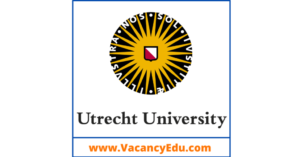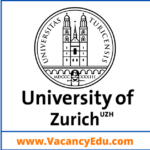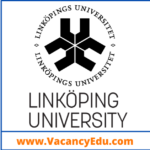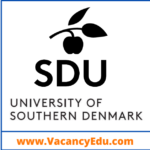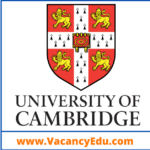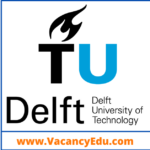Utrecht University, Netherlands invites online Application for various Postdoctoral Fellowship in their different Departments. We are providing a list of Postdoc Fellowship positions available at Utrecht University, Netherlands.
Eligible candidate may Apply as soon as possible.
(01) Postdoctoral Fellowship Position
Postdoc Fellowship Position summary/title: PhD Candidate: History of Global North-South Public Health Cooperation
Deadline : 28 June 2024
(02) Postdoctoral Fellowship Position
Postdoc summary/title: PhD position in Molecular control of growth-immunity trade-offs in Arabidopsis
Deadline : 17 June 2024
Looking for more Postdoctoral Positions Click Here
(03) Postdoctoral Fellowship Position
Postdoc Fellowship Position summary/title: PhD position in Molecular control of growth-immunity trade-offs in lettuce
Current projections show that the incidence of diseases on crops will increase in the coming decades, and thus, conceptually new strategies, beyond strengthening the immune system, are needed to ensure the resilience of future crops. It turns out that plants slow down their growth during and after an immune response regardless of the disease intensity. However, how these growth processes are regulated in plants is unclear. In this curiosity-driven PhD project, you will uncover the genetic and molecular basis of plant growth during and after an immune response. With this knowledge, one could develop approaches that reduce this tradeoff in crop growth. You will primarily work with lettuce (Lactuca sativa), but conservation of the deduced concepts can be investigated in other plant species, such as Arabidopsis thaliana.
Deadline : 17 June 2024
(04) Postdoctoral Fellowship Position
Postdoc Fellowship Position summary/title: Two PhDs in Innovation/Global Governance for Earth and Space Sustainability
The Copernicus Institute of Sustainable Development at Utrecht University has opened two, fully funded, four-year PhD research positions to join the cutting-edge research project ‘Planetary Stewardship in view of Earth-Space Sustainability’ (PLANETSTEWARDS). This research project is led by Assistant Prof. Xiao-Shan Yap, and funded for five years (2024-2029) through a 1.5 million euro ‘Starting Grant’ from the European Research Council (ERC).
Activities in outer space have grown exponentially in recent years, led by an increasing variety of actors from technologically advanced states to billionaire companies and small ventures. While space-based infrastructures such as satellites are essential for basic operations on Earth, space technologies are also presented as the frontier of opportunities and solutions for addressing sustainability crises: global accessibility to the Internet with thousands of satellites, giant solar power stations in Earth’s orbit, resources near and on the Moon, and billionaires’ vision of building space settlements such as on Mars to prevent the extinction of human species. These developments impact sustainability on Earth and in space in various ways. Not only are there rising concerns over space congestion and debris in Earth’s orbit, technological and resource competition on other celestial bodies can cause environmental degradation on those objects, intensify political polarization, fragment sustainability narratives, and perpetuate global inequality. The relations between Earth and space sustainability problems have, therefore, become more intertwined than ever. The fundamental values, beliefs, and institutions that guide stewardship for sustainability require a paradigmatic shift towards simultaneously caring for Earth and space.
Deadline : 30 June 2024
(05) Postdoctoral Fellowship Position
Postdoc Fellowship Position summary/title: PhD in Ethics
The ageing of societies is one of the 21st century’s most disruptive demographic trends. Simultaneously, age-related technologies challenge the ‘naturalness’ of ageing and draw into focus ambiguities in the concept of ageing itself. For instance, technologically-mediated relationships, life extension, and technologies such as AI avatars may make biological and chronological age less relevant, and shift the emphasis to socio-cultural conceptions of age. Such shifts have normative significance particularly if ageing is envisaged as a process that occurs throughout the lifespan.
Since ageing is a phenomenon infused with normativity, with normative expectations corresponding to phases in the human life cycle, the conceptual cleavage of ageing invites innovation in related moral concepts. This PhD project examines ways in which technologies that bear on ageing disrupt biological, socio-cultural, and normative understandings of ageing. It considers how these disruptions generate fruitful possibilities for reconceptualisation of ageing itself, as well as intertwined normative ideas of personhood, meaning, and vulnerability. In doing so, the project will investigate non-western and non-canonical ideas that might reinvigorate core moral concepts implicated by ageing.
Deadline : 7 June 2024
Click here for “Postdoc Application Cover Letter Template”
Click here to know “How to write a Postdoc Job Application or Email”
(06) Postdoctoral Fellowship Position
Postdoc Fellowship Position summary/title: PhD: Reconceptualising Solidarity for Technologically Disrupted Contexts
This PhD project is an ethical and philosophical study of how technology might (re)shape communal practices and the concepts to describe such practices, notably the concept of solidarity. ‘Solidarity’ plays a fundamental role in many social practices, ranging from political activism to the norms underpinning the welfare state. Over recent years, solidarity has also (re-)emerged as a central concept in moral and political philosophy. Solidarity relations are typically connected to shared social roles: individuals are in solidarity as democratic citizens, workers, those subject to oppression and domination etc.
Disruptive technologies have the potential to deeply reshape these shared experiences and identities that matter for solidarity relationships. Think of genomic technologies in health care practices or artificial intelligence and big data in the (gig) economy. Will such changes to our practices fundamentally alter our understanding of social and political solidarity? On what basis might we conclude that communal concepts like solidarity or community are disrupted? And in what ways could technological change provide new avenues for solidarity bonds and social mobilisation?
Deadline : 7 June 2024
(07) Postdoctoral Fellowship Position
Postdoc Fellowship Position summary/title: PhD: Metabolomics of Endocrine Disruptors, Immune-Related Health & Liver Disease
Would you like to understand how endocrine disruptors affect human health? Are you passionate about metabolomics? Then a PhD position at the One Health Chemical group of the Institute for Risk Assessment Sciences (IRAS) might be just for you! We are offering an exciting PhD position to investigate the health effects of endocrine disrupting chemicals (EDCs) on multimorbidity, with a focus on metabolic dysfunction-associated steatotic liver disease (MASLD), metabolic and immune related diseases.
Deadline : 1 June 2024
(08) Postdoctoral Fellowship Position
Postdoc Fellowship Position summary/title: PhD position: Exploring microbial potential for PFAS transformations
This position is one of three PhD positions involved in the research programme. Each PhD researcher will work on its own line of research and will collaborate with the other PhD researchers, the rest of the research team and stakeholders in the living lab. All three PhDs within the PFAS Living Lab will contribute to making this a vibrant, impactful and interactive community. Would you like to contribute to developing sustainable solutions for removing and destroying PFAS substances, remediating this field?
In this PhD position you aim to advance our understanding of microbial tolerance to, and potential degradation of, PFAS chemicals. Using this knowledge, you will explore the extent to which microbial approaches may help in the development of integrated decontamination approaches in the field.
Deadline : 30 May 2024
Click here to know “How to Write an Effective Cover Letter”
(09) Postdoctoral Fellowship Position
Postdoc Fellowship Position summary/title: PhD: Assessing Sub-daily Carbon and Water Exchange in the Amazon
The Amazon is an important ecosystem for carbon and water cycling. Because of climate change, the Amazon is in transition: experiencing more frequent droughts and taking up less carbon from the atmosphere. Monitoring the Amazon is challenging because of the relatively few local measurements, but through remote sensing we can observe the forest in great detail.
Deadline : 9 June 2024
Connect with Us for Latest Job updates
(10) Postdoctoral Fellowship Position
Postdoc Fellowship Position summary/title: PhD: on column testing and numerical modeling of PFAS flushing from soils
In the department of Earth Sciences we’re seeking a motivated PhD candidate to work on column experiments and numerical modeling of PFAS transport and desorption behaviour in soil. The goal is to understand and quantify the role of drainage systems by combining transport modeling of PFAS in unsaturated soils in the presence of a drainage system with column flushing experiments using field samples. Finally, results and procedures will be adapted for field scale application.
Deadline : 29 May 2024
(11) Postdoctoral Fellowship Position
Postdoc Fellowship Position summary/title: PhD: PFAS remediation on site: transport phenomena & immobilization
This research will run for four years and includes three PhD positions of which this is one position. Each PhD researcher will work on its own line of research but will collaborate with the other PhD researchers and stakeholders in the living lab. Would you like to contribute to developing sustainable solutions for removing and destroying PFAS substances, remediating this field?
Deadline : 29 May 2024
Polite Follow-Up Email to Professor : When and How You should Write
(12) Postdoctoral Fellowship Position
Postdoc Fellowship Position summary/title: PhD: Improving Psychological Treatments for Young People with Depression
Deadline : 1 June 2024
(13) Postdoctoral Fellowship Position
Postdoc Fellowship Position summary/title: 2 PhD Positions in Literary and Cultural Studies: Ecologies of Violence
As a PhD candidate you will be working on a subproject within the Consolidator Grant project EcoViolence (2024–2029) funded by the European Research Council (ERC) and directed by Dr Susanne C. Knittel
EcoViolence is an interdisciplinary, transnational, and comparative study of the cultural imaginary of environmental violence. The project’s aim is to understand how contemporary culture frames and remembers environmental degradation as violence; how it can make visible the deep historical roots that tie eco-violence to other histories of violence, especially colonialism and genocide; and how it articulates and reflects on questions of guilt, responsibility, and implication. EcoViolence will bring together research in cultural memory studies and ecocriticism in order to develop an innovative ecological model for the study of violence, its memory and representation. Furthermore, the project explores how these representations harness affect and emotion to promote critical self-reflection. The project focuses on narrative and visual media and takes a comparative, multilingual, and media-specific approach.
Deadline : 1 June 2024
(14) Postdoctoral Fellowship Position
Postdoc Fellowship Position summary/title: PhD Position: Molecular Mechanisms of Protein Biogenesis
We are working at the interface of biochemistry, molecular biology and biophysics to follow the journey of nascent proteins toward their functional structures as they emerge from the ribosome. These mechanistic studies pave the way for targeted interventions against protein misfolding and perturbed protein homeostasis which are important for a number of aging-related diseases, including neurodegeneration, and several forms of cancer.
, which just relocated from Johns Hopkins University to Utrecht, has established single-molecule optical tweezers assays for probing nascent protein folding on the ribosome. These studies have shown how the ribosome and molecular chaperones counter misfolding and help large, multi-domain proteins attain their functional structures. The group is now combining mechanical manipulation with single-molecule fluorescence detection. These in vitro studies are complemented by cellular assays. Collectively, the work is revealing fundamental principles of cellular protein biogenesis.
Deadline : 30 May 2024
(15) Postdoctoral Fellowship Position
Postdoc Fellowship Position summary/title: PhD: Developing Scalable Multiple Imputation Routines for Longitudinal Data
The department of Methodology and Statistics
has a job opening for a PhD candidate. In this position, you will develop novel statistical algorithms to treat missing data in large, longitudinal datasets. Doing so will require you to develop a broad base of statistical expertise and a diverse data analytic toolkit. You will work with Bayesian modelling, (longitudinal) structural equation modelling, high-dimensional prediction algorithms, and computational statistics/numerical methods. You will also have the opportunity to learn high-performance statistical computing techniques and develop highly marketable software development skills. Just for good measure, we’ll throw in four years of intensive on-the-job training in open-science workflows and open-source software development. Are you up for the challenge?
Today’s researchers are blessed with a wealth of high-quality, publicly available, longitudinal datasets. Yet, these data are nearly always incomplete, so fully realising the potential of these rich datasets requires principled missing data treatments. Multiple imputation (MI) is one of the most flexible and broadly applicable principled missing data treatments available. Treating missing data with MI can produce optimal results if the assumptions of the underlying predictive models are satisfied. However, the task of satisfying these assumptions in datasets with hundreds of variables linked by complex, multivariate relations—like the datasets implied above—remains a daunting challenge.
Deadline : 2 June 2024
(16) Postdoctoral Fellowship Position
Postdoc Fellowship Position summary/title: PhD Position: Optimal Models for AI-Assisted Systematic Review (ASReview)
The rapidly evolving field of AI offers promising solutions to the literature screening challenge using machine learning models, like active learning, and, very recently, large language models (LLMs). However, many of these AI-driven solutions emerge from tech companies that publish new models at an unprecedented rate. The rapidity of advancements in the field of AI outpaces meticulous scientific evaluations, leaving many methods unrefined and unproven. The challenge is twofold: keeping pace with these relentless innovations while collaboratively forging a comprehensive understanding of their strengths and limitations.
In the evolving landscape of AI-aided systematic tools (like ASReview , we need to explore which AI model can best be used for which type of data. For instance, while the active learning model (ALM) can facilitate literature screening by presenting the most likely relevant record, the human still needs to make the final labeling decision. In contrast, an LLM can directly generate such labels with explanations, without human input. This project envisions a collaborative approach that leverages the strengths of both humans and different artificial intelligence solutions in systematic screening.
Deadline :26 May 2024
Top 16 Tools for Researchers in 2022
About Utrecht University, Netherlands – Official Website
Utrecht University is a public research university in Utrecht, Netherlands. Established 26 March 1636 (385 years ago), it is one of the oldest universities in the Netherlands. In 2018, it had an enrolment of 31,801 students, and employed 7,191 faculty and staff. In 2018, 525 PhD degrees were awarded and 6,948 scientific articles were published. The 2018 budget of the university was €857 million.
Utrecht University counts a number of distinguished scholars among its alumni and faculty, including 12 Nobel Prize laureates and 13 Spinoza Prize laureates. Utrecht University has been placed consistently in the top 100 universities in the world by prominent international ranking tables. The university is ranked the best university in the Netherlands by the Shanghai Ranking of World Universities 2019, ranking 13th in Europe and 49th in the world.
The university’s motto is “Sol Iustitiae Illustra Nos,” which means “May the Sun of Righteousness Enlighten Us”. This motto was gleaned from a literal Latin Bible translation of Malachi 4:2. Rutgers University, having historical connections with Utrecht University, uses a modified version of this motto.
Utrecht University is led by the University Board, consisting of prof. dr. Henk Kummeling (Rector Magnificus), prof. dr. Anton Pijpers (Chair) and prof. mr. Annetje Ottow (Vice Chair).
Close ties are harboured with other institutions internationally through its membership in the League of European Research Universities (LERU), the Utrecht Network and the European University Association (EUA).
Disclaimer: We try to ensure that the information we post on VacancyEdu.com is accurate. However, despite our best efforts, some of the content may contain errors. You can trust us, but please conduct your own checks too.
Related Posts
- Postdoctoral Fellowship (36) at Harvard University, United States

- Postdoctoral Fellowship (03) at EMPA, Zurich, Switzerland

- Postdoctoral Fellowship (14) at University of Zurich, Switzerland

- Postdoctoral Fellowship (04) at Maastricht University, Netherlands

- Postdoctoral Fellowship (09) at Groningen, Netherlands

- Postdoctoral Fellowship (05) at Linkoping University, Sweden

- Postdoctoral Fellowship (17) at University of Southern Denmark, Denmark

- Postdoctoral Fellowship (28) at University of Cambridge, United Kingdom

- Postdoctoral Fellowship (13) at Delft University of Technology (TU Delft), Netherlands


